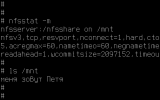Greetings all,
after rebuilding my server, the NFS does not work again. I have configured both the server and the client as per the previously working configuration, but
Trying to restart mountd(8), which I understand could cause the problem results in:
Of course /etc/exports is not readable since it does not exist. But (i) this configuration worked before and (ii) according to previously cited article https://klarasystems.com/articles/nfs-shares-with-zfs/, OpenZFS v. 2.1 reads the parameters for mounting from /etc/zfs/exports, which exists and is correctly configured by the
So, what is the solution? Using the /et/exports? In that regard, I note that the zfs(8) for 13.1-RELEASE, does not have the hack(?) of the previous 12.3-RELEASE:
Kindest regards,
M
after rebuilding my server, the NFS does not work again. I have configured both the server and the client as per the previously working configuration, but
showmount -e server_IP results in
Code:
PRC: Program not registered
showmount: can't do exports rpc
Code:
/etc/rc.d/mountd: WARNING: /etc/exports is not readable
/etc/rc.d/mountd: WARNING: failed pecmd routine for mountd zfs sharenfs command.So, what is the solution? Using the /et/exports? In that regard, I note that the zfs(8) for 13.1-RELEASE, does not have the hack(?) of the previous 12.3-RELEASE:
and even this implies that the manner described in the above-cited article is preferable.A file system with a sharenfs property of off is managed
the traditional way via exports(5). Otherwise, the file system is
automatically shared and unshared with the "zfs share" and "zfs
unshare" commands.
Kindest regards,
M


